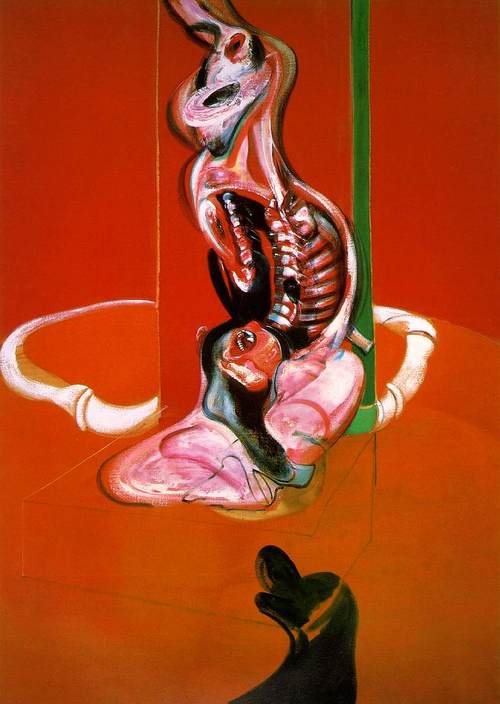May 12, 2007
Last week...
1. Ballard's exhausted texts. Owen on the largely dis-spiriting, though excellently organised, Ballard conference at UEA. There was much celebration of Ballard 'finally getting the recognition he deserved' but it seems to me that anyone worthwhile (from Burroughs to Jameson to the post-punks to Eshun to the Ccru) has long ago recognized Ballard's merit to the point where he is now ultra-canonic for any group that matters. (I recall that after my interview with Kode9, one commenter on Dissensus complained of the ubiquity of Ballard - 'don't they read anything else?') It is usually a cause for alarm when 'general opinion' catches up with underground consensus; and Ballard has become respectable only long after his novels ceased to be formally experimental. The lost diagonal that the 60s Ballard represented, as Owen argues, is not the experiemental per se, but a popular experimental, a pulp modernism. It may be that Ballard has already enjoyed his moment of greatest contagion; as Owen remarked while we wandered among UEA's ziggurats, there is case for claiming that - because of its dissemination in post-punk - The Atrocity Exhibition was the most influential of all post-war fictional texts.
Roger Luckhurst argued that it was time that Ballard, who is continually writing a book with which he is clearly bored, was 'rescued from the novel'. Sadly, however, the sites that allowed Ballard to publish his experimental short fiction no longer exist. With Kingdom Come Ballard seems to have reached a point of exhaustion; in his best works, there was always an excess of unconscious imagery over the texts' auto-theorization. But that unconscious imagery now seems to be used up, and, in Kingdom Come, what remains is what Roger characterised as a 'hectoring polemic'. Does the future lie perhaps in something like the 'fantasy kits' that I called for in my piece on Steven Meisel's 'State of Emergency' over at Ballardian? (Speaking of which, for a more positive account of the event, see the delightful Simon Sellars' account. )
2. Rufige's return. Another, lost, popular-experimental vector: me on Rufige Kru and jungle in Fact.
3. Ferry's Fascist groove thing. Lawrence Miles returns with another bumber-package of acute observations, including this on Bryan Ferry:
- am I the only one who doesn’t feel that Bryan Ferry has actually done anything wrong this week? [No, you're not - k-p.] All he seems to say in his “evil” interview is that the Nazis knew how to present themselves, which I would have thought was obvious (although he does have good things to say about the architecture of Albert Speer, which is harder to accept… Nazi designs tend to use sheer size to distract people from their banality and childishness, a bit like The Lord of the Rings). Is our view of politics / morality / history now really so retarded that if we know something to be corrupt, murderous and – let’s not beat around the bush – foreign, then we have to act as if the people responsible had no aesthetic sense and were probably all ugly as well? As if Hitler could have rallied the German population to his cause with posters saying “Join the Nazis: We’re Completely Shit”.
Which reminded me of Daniel's argument that 'no power, no matter how brutally fascistic, ever actually declares itself to be for the reign of mystique or tyranny.' How could mystique work if it actually declared itself to be mystique? Which brings me to...
4. Zizek's disciplined hedonism. Daniel has an excellent response to Jodi's two posts defending some of the positions Zizek advanced in his 300 article. Two of Daniel's points are particularly worth reinforcing here.
Firstly, the opposition between discipline and permissive hedonism actually contradicts Zizek's previous emphasis on the way in which hedonism actually entails discipline. As Daniel puts it, 'far from "discipline and a spirit of sacrifice," functioning in Zizek's work as "objects jamming the machinery of enjoyment," as Jodi claims, they are the very things which, according to him, keep it happily ticking over.' (Nevertheless, it is important not to fall back into Sixties naivete about the supposed inherent subversions of pleasure, and Jodi is right to be suspicious of the discredited notion that 'the problems of the late 60s could be remedied by a few good orgasms.' Still, is it quite right to say that 'the left can't provide strong alternatives to capitalism because it enjoys it'? As I've argued before, it is essential for any anti-capitalist struggle to give up the idea that capitalism is an enemy that is 'out there', a purely impersonal structure in which we in no way participate, but couldn't it equally be argued that the left can't provide strong alternatives to capitalism until it presents alternative models of enjoyment? Part of the problem with Zizek's analysis in the 300 piece is that, in flipping between discipline and hedonism, it remains internal to neo-liberal logic. The current model of capitalism requires us to be disciplined workers as well as pleasure seekers - doesn't Sarkozy's flaccid slogan 'work more to earn more' make this perfectly clear? The parties of Capital have managed to successfully portray leftists as both permissive hedonists and dour 'thieves of enjoyment'. The task of withdrawing from capital's toxic pleasures must also involve inventing new forms of collective jouissance.)
Secondly, I think Daniel is right to re-assert the importance of the difference between a strategic neccesity and something for which one stands. To say that violence is necessary does not entail that one stands for violence. But to make this distinction does not, as Jodi argues, set up a conflict between values and strategic principles. Violence only conflicts with leftist 'values' - I use the scare quotes mindful of Daniel's quering of the very concept of 'values' - when it is posited as a value.
5. Reza's rotting objects.I had a flash of revelation during Reza Negarestani's typically dense presentation at Goldsmiths on Wednesday: fluids can't decay. Reza argues that only solids can succumb to 'softness' without 'transgressing their ontological register'. What we have, in Reza's Scholastic-infused philosophy, is an account of solid objects that defines them in terms of their capacity to decay. It is decay that marks the limits of an object. Decay can only be attributed to an object (there is no free-floating decay), and only while the object remains an object (if the object is completely consumed, or entirely transformed, then there is neither decay nor an object).
Posted by mark at May 12, 2007 05:44 PM | TrackBack
